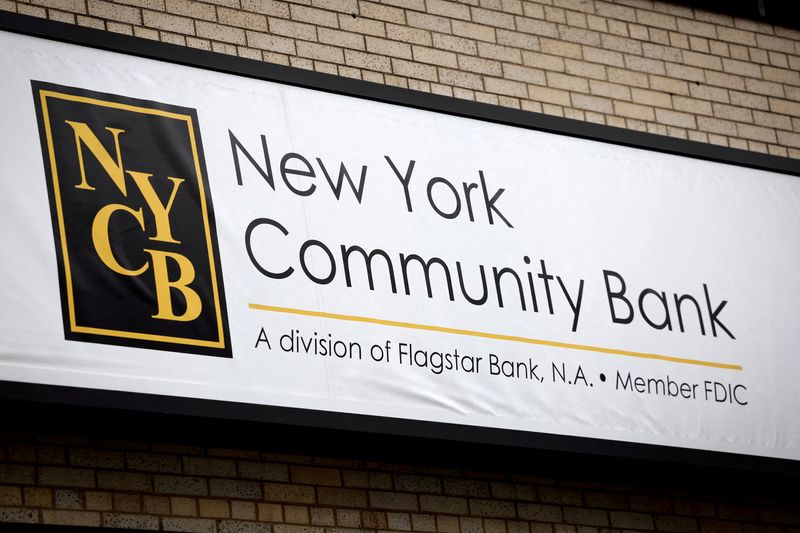By Manya Saini
(Reuters) -New York Community Bancorp (NASDAQ:CTBI) has sold some loans for gains and was working to integrate collapsed lender, Signature Bank (OTC:SBNY), into its financial reporting process, it said in its annual report on Thursday.
Its first quarter will include the sale of consumer loans worth $899 million on March 13 and a commercial co-operative loan in late February as the lender works to cut exposure to the beleaguered commercial real estate (CRE) sector.
Several Wall Street analysts have flagged concerns that the turnaround could take a long time as profit remains under pressure from its efforts to boost reserves for potential bad loans.
NYCB had earlier this month said it was getting interest from non-bank bidders for some of its loans and would outline a new business plan in April while once again cutting its dividend and disclosing a 7% drop in deposits.
The lender also named Joseph Otting, former Comptroller of the Currency in the Trump administration, as CEO as part of a $1 billion capital injection from a group of investors that included former Treasury Secretary Steven Mnuchin.
The bank's troubles began late in January when it reported a surprise loss and slashed its dividend.
It again came under pressure toward the end of February after flagging "material weakness" in internal controls and revised its loss to more than 10 times of what it had earlier disclosed.
Shares of NYCB reversed course to trade 3% lower on Thursday after the lender filed its annual report. They have lost about 64% this year, with analysts expecting trading to remain 'range bound' until NYCB lays down a concrete turnaround plan.
NYCB has taken several steps to calm investor worries over its stability, including shares purchases by top executives and shuffling its management.
It is now subject to stricter capital and liquidity norms as its balance sheet exceeds the $100 billion regulatory threshold due to the acquisition of Flagstar and purchase of some assets of failed Signature Bank.
CREDIT RISKS
NYCB said its CRE loans are secured by income-producing properties such as office buildings, retail centers, mixed-use buildings and multi-tenanted light industrial properties.
"We may incur future losses on commercial real estate loans due to declines in occupancy rates and rental rates in office buildings, which could occur as a result of less need for office space due to more people working from home or other factors," it said in the filing.
As of Dec. 31, $3.4 billion, or 32.1% of the bank's CRE loan portfolio, was secured by office buildings.
The lender's multi-family portfolio, however, includes properties subject to rent control regulations, which limit landlords' freedom to raise rents when interest rates are high.

NYCB said 44%, or $37.3 billion of its total loans, consisted of multi-family loans as of Dec. 31. This was down slightly compared with $38.1 billion a year ago.
The bank also estimated a rise in the special assessment fees by the Federal Deposit Insurance Corporation to cover a hole in the deposit insurance fund that was drained in the regional banking turmoil of March 2023, but said it was not expected to be material.